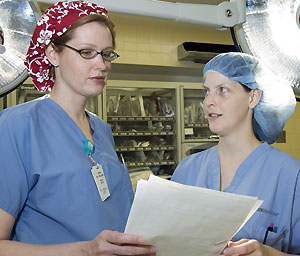When Amber Traugott started classes in the School of Medicine, there was only one thing she was absolutely sure of — she did not want to become a surgeon.
Several years and a couple tours of duty later, she is preparing to begin her residency in surgery at Barnes-Jewish Hospital after graduating today.

“On my first day of the surgery rotation, I walked in and said, ‘I just want to get this over with so I can get back to (St. Louis) Children’s Hospital,'” Traugott recalls.
She had already completed rotations in medicine, OB-GYN and pediatrics and thought she would go into pediatrics. However, her experience in the surgical rotation made it clear to her that she was meant for surgery — despite passing out on her first day in the operating room.
“I found that I was having an easier time getting out of bed at 4:30 a.m. for surgery than I was at 6 a.m. for the other rotations,” she says. Traugott also found herself spending her free time reading about surgery.
“Surgeons have the potential to be able to cure patients or solve problems that are going on,” she says. “It is very satisfying when it goes well, because they are making things better, not just managing an illness.
“A lot of really respected surgeons are very emotionally involved in their patients and the outcomes of their patients, and that’s also true for me,” she says.
The Wisconsin native has had a lot of experience making things better for people in need. As an undergraduate junior, Traugott enlisted in the U.S. Army and was assigned to the 3rd Infantry Division, where she learned Arabic and trained in intelligence. She was sent to Guam in 1997, where she worked as a translator at a camp for Iraqi and Kurdish refugees. She and other interpreters also helped prepare the refugees for assimilating into American culture after they left Guam.
|
School of Medicine |
Traugott was sent to Kuwait in 1998 as part of the U.S. ground-force presence. When her active duty ended in 1999, she completed her bachelor’s degree in genetics at the University of Georgia, graduating magna cum laude with college honors. That helped earn her a Distinguished Student Scholarship at the WUSTL School of Medicine, a merit-based, four-year, full-tuition award.
In the middle of her second year of medical school, the Army called again, and she served six months as a cryptologic linguist, listening to Arabic “chatter” from Fort Gordon, Ga. Prior to picking up where she left off at the School of Medicine, she volunteered for Wesley Clark’s presidential campaign.
“I like to feel that I’m doing something that matters to somebody else,” she says, “and I also like to know that I’m doing whatever it is I’m doing to the best of my ability.”
While at the medical school, Traugott worked in the lab of Janet S. Rader, M.D., professor of obstetrics and gynecology and of genetics, characterizing genetic markers in cervical cancer lines. Traugott credits Rader with being instrumental in her development as a researcher.
She also credits Jeffrey F. Moley, M.D., professor of surgery, with giving her the opportunity to publish a paper, and Timothy G. Buchman, M.D., Ph.D., the Harry Edison Professor of Surgery, professor of anesthesiology and of medicine, with giving her advice on how to approach a career in surgery and for being the first person to put a surgical knife in her hand.
“Amber is driven to succeed,” Buchman says. “There are many obstacles — most minor, some major — to getting the work done on a busy surgical service. For Amber, failure is not an option.
“She is mature beyond her years,” Buchman continues. “It is immediately evident that her military experience seasoned her to manage complex situations and parallel problems. She is among the very best I have ever encountered in the past 25 years, and her future as a leader is certain.”